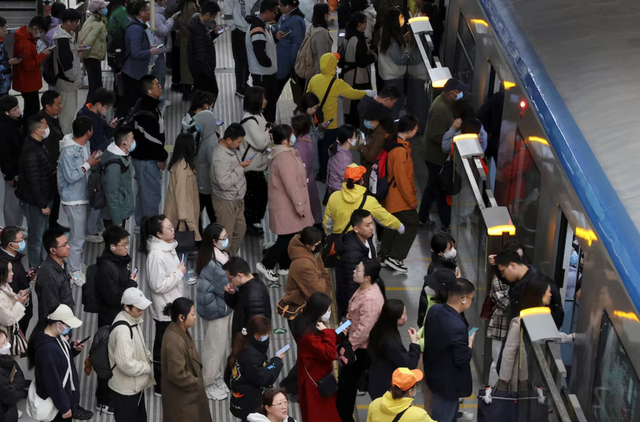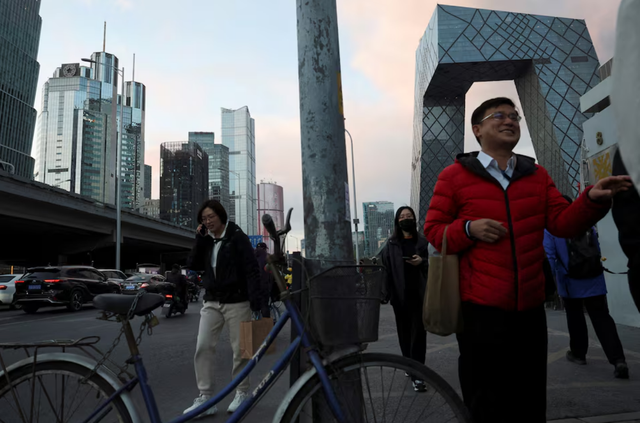
People stand by a window at an office tower during evening hours in Beijing, China March 27, 2025. Photo: Reuters
Staff at Midea once toiled till late in the evening, but now they're told to leave by 6:20 p.m. The company's page on social media app WeChat even shows a photo of people listening to a band with a caption that reads: "What do you do after work? It's after work when life really starts."
In China, this counts as radical corporate messaging, a sharp contrast to "996" or the practice of working from 9 a.m. to 9 p.m. six days a week - famously called a "huge blessing" by Alibaba co-founder Jack Ma and an integral part of its tech sector for much of the past 15 years.
Other companies have also made changes, even if not quite as dramatic. At fellow appliance maker Haier, employees have celebrated on social media the introduction of a five-day work week. Workers at DJI, the world's largest drone manufacturer, have posted about their joy at a new policy declaring offices must be vacated by 9 p.m.
"No more worrying about missing the last metro, no more worrying about waking up the wife when I get home," wrote one DJI worker who said he often used to work past midnight.
Haier and DJI did not respond to requests for comment.
In another sign of how the zeitgeist for China Inc is slowly changing, a Beijing law firm was fined in March for not taking corrective measures after it illegally extended staff working hours - a rare imposition of a penalty by authorities that drew widespread praise on social media.
But whether these nascent corporate efforts will turn into winds of change remains to be seen.
Analysts say the mandatory clock-offs seem to have been prompted by changes to European Union labour laws rather than a welling up of social pressure within China. And while "996" was deemed illegal by China's top court in 2021, many people in tech and finance still work extraordinary long hours. Recent years have even seen the emergence of a new term "007", referring to being either at work or on call all day every day.
Significantly, however, China's government is calling for companies to abide by the country's 44 hour weekly work limit.
A State Council action plan to boost consumer spending unveiled in March said workers' rights to rest and vacation should be guaranteed and paid leave should be encouraged. State media have also run articles making those points.
That fits with Chinese policymakers' desire to see the world's second-largest economy driven more by consumption and less reliant on exports - a goal that has only taken on more urgency with the imposition of additional hefty U.S. tariffs under President Donald Trump.
Shujin Chen, China economist at Jefferies, says that while the government is earnest about promoting change, it won't be easy given how the country's sputtering economic growth and lack of jobs have fed financial insecurity.
"They want people to like relax more, have more holidays and consume more," she said. "If you don't have enough income, and if you hardly keep your job, it's very hard for people to do that."

Commuters line up to board a train at a subway station near the Zhongguancun tech hub, during morning rush hour in Beijing, China March 27, 2025. Photo: Reuters
A long week
China has a long average working week - at 46.1 hours in 2024, according to the International Labour Organisation. That compares with 38.6 hours in South Korea, 38 hours in the United States and 36.6 hours in Japan.
Chinese government data puts the number even higher at 49.1 hours in January, up from 46.2 in April 2022, the earliest date for which data is publicly available. The sharp increase can be explained by rising job insecurity, spurring people's willingness to do more overtime.

Commuters walk beside skyscrapers at the central business district (CBD) in Beijing, China March 27, 2025. Photo: Reuters
Before this year, there had been some, albeit rare, pushback within China against excessive working hours.
Tech workers launched online protests against "996" in 2019 and 2021. And last year, a PR executive at search engine giant Baidu was made to apologise after demanding employees have their phones on 24 hours a day and be always ready to respond.
One tech behemoth, social media and gaming firm Tencent, has also cut way back on overtime in at least some of its units, meaning many workers no longer stay back, two employees said. Tencent did not reply to a request for comment.
This year's shift to mandatory clock-off times by some companies stems from the EU's adoption of new rules in December, said Liu Xingliang, a Beijing-based independent industry analyst. The rules ban the sale of products made with forced labour, a definition that encompasses excessive overtime.
"These big companies fear losing overseas orders due to violations," said Liu, noting that while manufacturers of goods were feeling pressure from this law, China's internet and software firms are less likely to be impacted.

A man walks past a DJI flagship store during evening hours in Beijing, China March 27, 2025. Photo: Reuters
Midea formalised its new rules which ban "performative overtime" in January and employee feedback has "definitely been very positive," Zhao Lei, vice president of the company's home air conditioning division, said in a statement.
"We want to focus on generating innovation and creating value within the eight-hour work day, rather than after," he said.
Not all employees are completely convinced, however.
"I am not sure the changes are sustainable," said one employee who declined to be identified for fear of repercussions.
The employee said he was typically on call 24 hours a day and has previously been pulled into meetings even when on vacation.
($1 = 7.2632 Chinese yuan)


Max: 1500 characters
There are no comments yet. Be the first to comment.